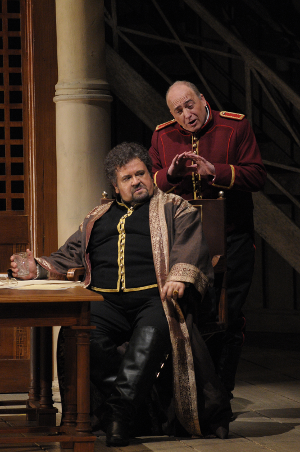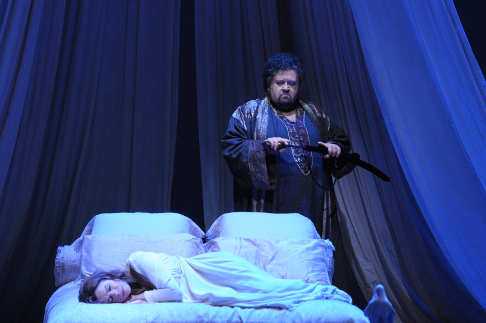23 Oct 2013
Verdi’s Otello at Lyric Opera of Chicago
Lyric Opera of Chicago has opened the season with a revival of its 2001 production of Giuseppe Verdi’s Otello.

Lyric Opera of Chicago has opened the season with a revival of its 2001 production of Giuseppe Verdi’s Otello.
The cast for the first performance included Johan Botha as Otello, Ana María Martínez as Desdemona, both Falk Struckmann and Todd Thomas singing the role of Iago, the former withdrawing because of indisposition after Act I. This performance also featured the American debut of tenor Antonio Poli as Cassio, John Irvin as Roderigo, Julie Anne Miller as Emilia, Evan Boyer as Lodovico, Anthony Clark Evans as Montano, and Richard Ollarsaba as a herald. The production was originally directed by Sir Peter Hall; the present revival is directed by Ashley Dean. Bertrand de Billy makes his Lyric Opera debut conducting these performances, and Michael Black is officially Chorus Master with the start of the current season.
 Johan Botha as Otello and Falk Struckmann as Iago
Johan Botha as Otello and Falk Struckmann as Iago
From the energetic start of the first act the role of the chorus of Cypriots is emphasized. As the people shout in their enthusiastic pleas for Otello’s success, Iago’s voice of negation is clearly audible. Struckmann’s Iago intoned with chilling force his contrary wishes for Otello’s failure and even demise in the “alvo frenetico del mar” (“frenzied bed of the sea.”). When the hero alights triumphantly on shore, he declares to the jubilant Cypriots “Esultate!” (“Rejoice!”). From this exciting start it was clear that Mr. Botha inhabits a role truly suited to his voice. The high dramatic notes and outbursts, so characteristic of Otello’s volatile nature, are produced effortlessly and with accurate, direct focus of pitch in Botha’s convincingly emotional delivery. In the subsequent duet between Iago and Roderigo the motive for jealousy and ill-will is revealed. Iago resents the recent promotion of Cassio to the rank of captain since he wished to receive the distinction himself. In his plan to exact vengeance Iago confides in Roderigo and urges the latter’s infatuation with Desdemona. Struckmann as Iago and Mr. Irvin in the role of Roderigo both showed a distinguished sense of lyrical line in the verbalization and coalescence of their respective emotions and thoughts. The sacrifice in this ruse will of course be Cassio who is encouraged to drink until he loses control. In this American debut Mr. Poli made a strong impression as a singing actor. His use of legato phrasing and fluid rise to high pitches is seamless, at the same time released in a physically demonstrative display of Cassio’s inebriation. (It was at this point in the ensemble that Struckmann’s voice began to suggest the strain from treatment for allergies which occasioned his withdrawal at the close of Act I.) Once Otello and Desdemona are awakened by the brawl between a drunken Cassio and incensed Montano, the seeming chaos is interrupted. Botha’s voice of authority cut through the choral pandemonium as he ordered “Abbasso le spade!” (“Lower your swords!”). His demotion of Cassio and reestablishment of order was sung as an extension of these commands with precise, idiomatic intonation. Once they are left alone Desdemona and Otello sing their celebrated love duet as a conclusion to Act I. For both Ms. Martínez and Mr. Botha the range between dramatic excitedness and tender intimacy is bridged naturally so that the tensions in this relationship develop logically in response to the surrounding events. When Botha declares “Vien … Venere splende” (“Come … Venus is shining”) as they return to their chamber, the projected tranquility for Otello covers a persona already shown to waver between extremes.
In Act II Mr. Thomas assumed the role of Iago. The substitution proceeded as seamlessly as could be hoped, since Thomas enhanced the villainous character with his further, bleak emphases. His rendition of Iago’s “Credo” was appropriately declamatory with an expected internalization of lines that tend toward self-reflection. After musing on this destructive resolve, Iago’s influence on Otello grows perceptibly. Thomas’s subtle repetition to Otello of the sentiment “Vigilate” (“Keep watch”), when speaking of Desdemona’s fidelity, began to function as a growing germ in the husband’s mind. At the entrance of Desdemona surrounded by her adoring followers Martínez sang a rising pure line on “Splende il cielo” (“the sky is bright”). Otello’s mood reacts to this optimistic depiction of nature until her first appeal is tendered on behalf of Cassio. In the following quartet, in which the couple is joined by the pair of Iago and his wife Emilia, Martínez’s voice surged with touching high pitches on “Dammi la dolce e lieta parola del perdon” (“Give me your sweet and happy word of pardon”). Emilia retrieves the handkerchief that Desdemona dropped, but she cannot withhold it from Iago and his plan. From this point forward the “Testimon” (“witness”), of which Thomas swears the possession so chillingly, will have palpable force. In their final duet Iago encourages Otello to exact vengeance at which juncture Botha released forte his most emotionally convincing top notes of the evening.
 Johan Botha as Otello and Ana Maria Martinez as Desdemona
Johan Botha as Otello and Ana Maria Martinez as Desdemona
The dramatic tensions of Act III followed inevitably from the preparatory scheming and doubt. Topics of the misplaced handkerchief and pardon for Cassio are interwoven musically in the duet for the two principals. Once Otello curses Desdemona while scorning her fidelity Martínez expresses the wife’s reaction of hurt with a piercing high note on “le prime lagrime” (“the first tears”). Otello’s public image is stained when he later casts Desdemona to the ground in the presence of all at court, including Lodovico the ambassador from Venice. In this role bass Evan Boyer’s announcement of the Doge’s letter was intoned with a resonance which he transformed with surprise upon witnessing Otello’s behavior. When everyone but Otello and Iago has left the pubic court at the close of the act, Thomas’s Iago proclaims triumphantly “Ecco il Leone!” (“Behold the Lion!”) as he places his foot on the prostrate conqueror.
Desdemona’s murder in Act IV by her husband Otello is preceded by a scene in which she remains together with Emilia and confides to her by means of “La canzon del Salice” (“the Willow Song”). Martínez’s diction and carefully shaped phrases made this aria not only a touchingly sung and memorable showpiece, but also a lyrical extension of Desdemona’s character elaborating on her persona within the entire opera. In addition to ever-increasing rising pitches on “Salice,” Martínez infused “cantiamo” (“Let us sing”) with a repeated piano delicacy. Her final, heartfelt cry of farewell to Emilia indicated a resignation to what must inevitably befall her. Indeed, after making his entrance Botha’s mix of tenderness and violence as he first looked at Desdemona sleeping, and then confronted her in excited dialogue summarized in mere moments the dramatic conflict of this entire tragedy. Iago’s triumph is ultimately exposed as treachery, yet the lyrical declarations and outbursts of love survive beyond the violent end for Desdemona and Otello.
Salvatore Calomino